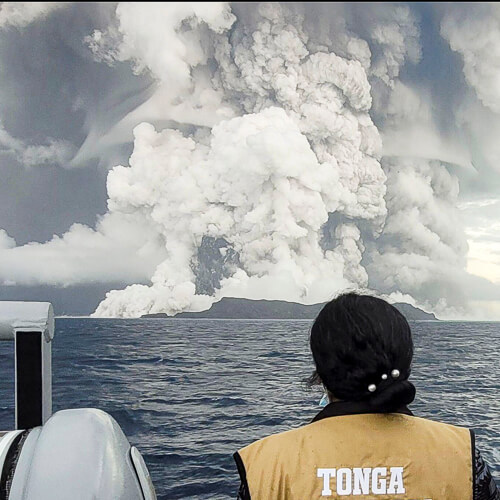Tonga faces a month without Internet in wake of eruption
Pacific island state Tonga will be without Internet services for at least a month after a massive volcanic eruption cut the sole international cable link.

The island state Tonga will be without Internet services for at least a month in the wake of last weekend's massive volcano eruption.
The eruption of the Hunga Tonga Hunga Ha‘apai undersea volcano cut Tonga's sole international cable, as well as the main domestic inter-island link.
Subsea cable company SubCom has said it will take at least four weeks to get the cable repaired, the New Zealand Foreign Ministry has advised.
Figure 1:  Dress rehearsal: Tonga Geological Services staff monitor Hunga Tonga Hunga Ha'apai erupting three days before the eruption that triggered a tsunami.
Dress rehearsal: Tonga Geological Services staff monitor Hunga Tonga Hunga Ha'apai erupting three days before the eruption that triggered a tsunami.
(Source: ZUMA Press, Inc./Alamy Stock Photo)
The company said it is working with Tonga Cable Ltd to mobilize a cable ship to the region, the BBC and Reuters reported.
Satellite lifeline
Currently Tonga's connection to the world is through satphone and limited satellite Internet.
Domestically, mobile phone company Digicel has set up a temporary system on the main island of Tongatapu using the University of South Pacific's satellite dish, which can support a 2G connection, the NZ ministry said.
The network has only 10% of full commercial capacity and will prioritize voice and SMS.
Australia's international development minister, Zed Seselja, said the government was working with Telstra to provide more satellite capacity.
Tonga's Hunga Tonga volcano just had one of the most violent volcano eruptions ever captured on satellite. pic.twitter.com/M2D2j52gNn
— US StormWatch (@US_Stormwatch) January 15, 2022
The giant explosion brought down the 830km Tonga Cable System (TCS) that connects the kingdom to Fiji, 827km to the northwest.
The cable lands in Suva, where it links to the northern leg of the Southern Cross network that runs across the Pacific from Sydney to the US West Coast.
Owned and operated by state-owned Tonga Cable, TCS was completed in 2013 at a cost of $36 million, funded mostly by the World Bank and the Asian Development Bank.
Prior to the cable's deployment, only 2% of the population had access to the Internet and just 0.9% could use broadband, according to the ADB.
Do look up
The cable cut, the second in three years, underlines the precariousness of Pacific communications and the need for some high-bandwidth redundancy.
An obvious opportunity beckons here for Starlink, OneWeb and other satellite broadband services.
Stay safe everyone 🇹🇴 pic.twitter.com/OhrrxJmXAW
— Dr Faka’iloatonga Taumoefolau (@sakakimoana) January 15, 2022
It may be that they are already prepping to provide emergency capacity to support the rescue effort. But there must be a business case for long-term satellite-based redundancy across the Pacific.
With the US and China competing for influence in the island states, it's likely that funding won't be hard to come by.
Tonga prime minister Siaosi Sovaleni has described the eruption just 65km north of the capital as an "unprecedented disaster".
Want to know more about satellite? Check out our dedicated satellite content channel here on Light Reading.
Data gathered so far suggests the volcanic explosion is the biggest on Earth in 30 years, creating 15-meter waves that demolished several islands and sending ash a record 39km into the atmosphere.
Tonga lies about 2,000km north of New Zealand and consists of 171 islands, of which only around 40 are inhabited. It has a population of 103,000, 70% of whom live on Tongatapu.
Related posts:
— Robert Clark, contributing editor, special to Light Reading
Read more about:
AsiaAbout the Author(s)
You May Also Like


.jpg?width=300&auto=webp&quality=80&disable=upscale)









